Daily Vocabulary Words: List of Daily Used Words in Leading Indian Newspapers
Hi there. Welcome to this special section @ Wordpandit. Our endeavour here is straightforward: highlighting daily vocabulary words that you would come across in leading newspapers in the country. We have included the following newspapers in our selection:
• The Times of India
• The Economic Times
• Hindustan Times
• Mint
• Indian Express
We are putting in extensive work to develop your vocabulary. All you have to do is be regular with this section and check out this post daily. This is your repository of commonly used words; essentially, we are posting a list of daily used words. Hence, this has significant practical application as it teaches you words that are commonly used in leading publications mentioned above.
Visit the website daily to learn words from leading Indian newspapers.
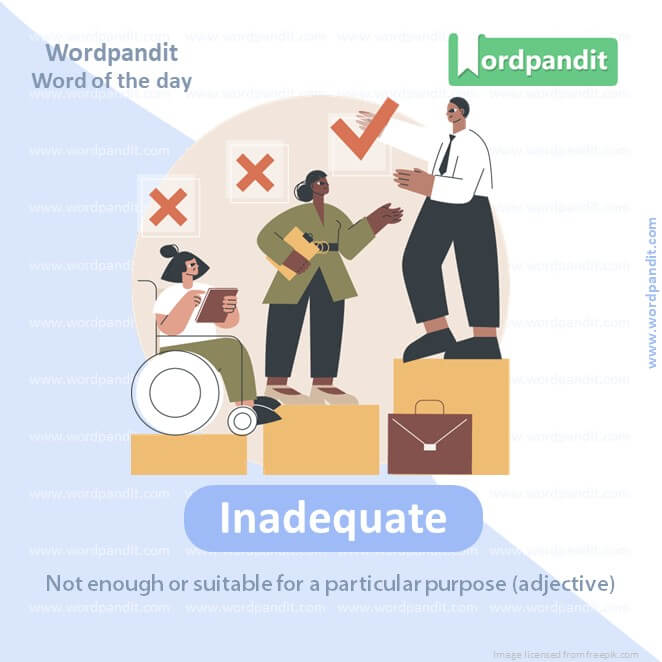
WORD-1: Inadequate
CONTEXT: Given the rising earnings of male workers, this meant that it became harder and harder for married women to work outside their home without making their husbands feel inadequate.
SOURCE: Times of India
EXPLANATORY PARAGRAPH: Imagine you have a small toy box, and you try to fit in a very big toy that just won’t go inside. The toy box is too small or not enough for the big toy. That’s when we say the toy box is “inadequate” for the toy.
MEANING: Not enough or suitable for a particular purpose (adjective).
PRONUNCIATION: In-add-eh-kwut
SYNONYMS: Insufficient, insufficient, lacking, deficient, unsuitable, insufficient.
USAGE EXAMPLES:
1. The room was inadequate for such a large meeting.
2. His response was seen as inadequate by the committee.
3. The hotel’s facilities were inadequate for the number of guests.
4. She felt inadequate as a mother.
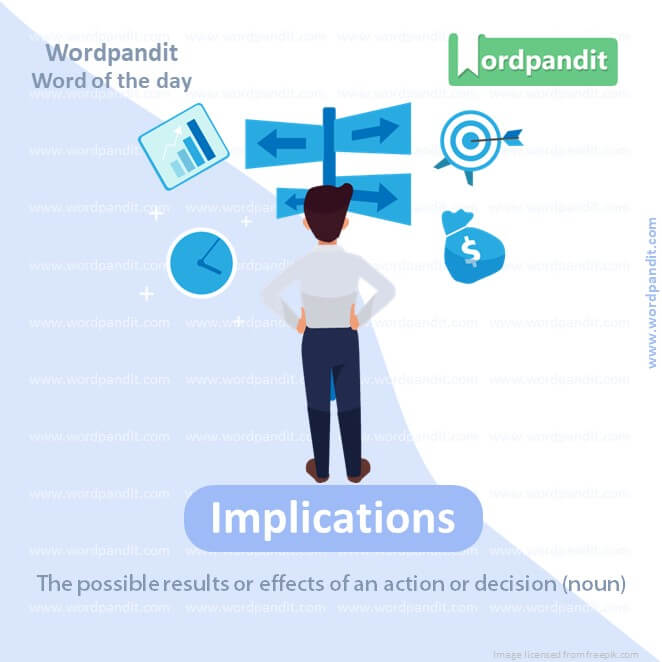
WORD-2: Implications
CONTEXT: The focus is on the US, but there are obvious and important implications for India.
SOURCE: Times of India
EXPLANATORY PARAGRAPH: Imagine when you drop a stone in water, and circles start to spread out from where it fell. Those circles are like the effects or results of dropping the stone. “Implications” are like those circles – the results or effects of something that happened or was said.
MEANING: The possible results or effects of an action or decision (noun).
PRONUNCIATION: Im-pli-kay-shuns
SYNONYMS: Consequences, repercussions, ramifications, results, outcomes.
USAGE EXAMPLES:
1. The implications of the new law are still unclear.
2. His actions have serious implications for the community.
3. What are the environmental implications of this decision?
4. The implication of her words was that she was leaving.
WORD-3: Sheer
CONTEXT: It is no accident that the turn-around takes place in the 1930s when the Great Depression forces women to seek employment for sheer economic survival.
SOURCE: Times of India
EXPLANATORY PARAGRAPH: Imagine you have a very thin curtain on your window, and you can almost see through it. That’s called “sheer.” It also means something that’s very steep or straight up and down, like a cliff.
MEANING: Extremely thin and light, almost transparent (adjective); straight up and down or very steep (adjective).
PRONUNCIATION: Sheer
SYNONYMS: Transparent, utter, absolute, complete, thin.
USAGE EXAMPLES:
1. She bought a sheer dress for the beach.
2. The cliff was sheer and daunting.
3. It was sheer luck that we found her.
4. The room was decorated with sheer curtains.
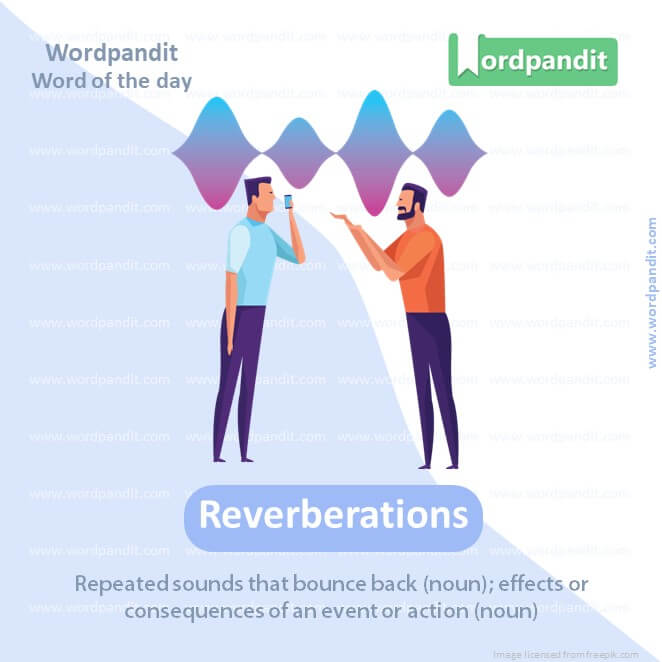
WORD-4: Reverberations
CONTEXT: The reverberations from the ongoing conflict in West Asia are being felt in markets across the world.
SOURCE: Indian Express
EXPLANATORY PARAGRAPH: Imagine you shout inside a big empty cave and then hear your voice come back to you several times. Those coming back sounds are called “reverberations.” It’s like an echo but can also mean the effects of something big that has happened.
MEANING: Repeated sounds that bounce back (noun); effects or consequences of an event or action (noun).
PRONUNCIATION: Rev-er-buh-ray-shuns
SYNONYMS: Echoes, repercussions, reflections, resonances, aftershocks.
USAGE EXAMPLES:
1. The announcement had widespread reverberations throughout the company.
2. The cave produced deep reverberations when he shouted.
3. The city felt the reverberations of the economic downturn.
4. The concert hall is designed for the best sound reverberations.
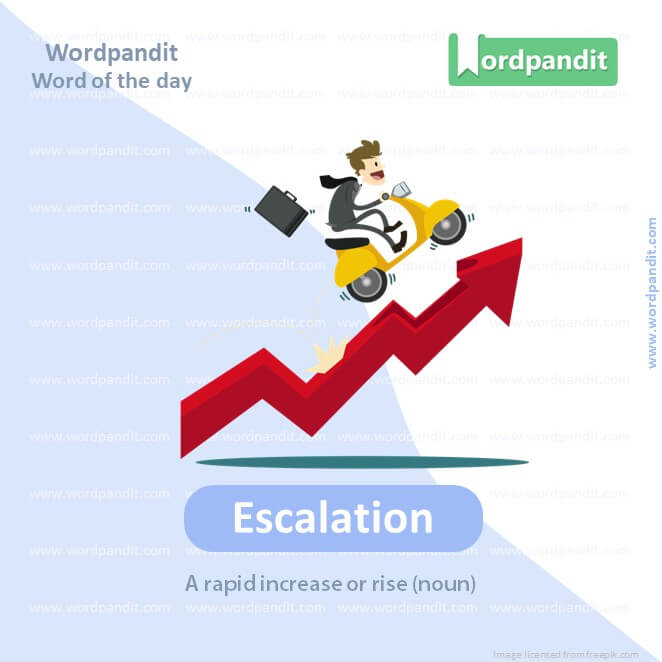
WORD-5: Escalation
CONTEXT: There is a concern that an escalation in the conflict engulfing the region could push prices higher.
SOURCE: Indian Express
EXPLANATORY PARAGRAPH: Picture a moving staircase, called an escalator, that takes you from one floor to another in a mall. “Escalation” is like that but not about stairs. It means something is increasing or growing bigger, especially problems or conflicts.
MEANING: A rapid increase or rise (noun).
PRONUNCIATION: Ess-ca-lay-shun
SYNONYMS: Increase, upsurge, surge, growth, intensification.
USAGE EXAMPLES:
1. There’s an escalation in the cost of living.
2. The escalation of violence in the area is concerning.
3. Government measures led to an escalation of the crisis.
4. Diplomats are trying to prevent any further escalation.
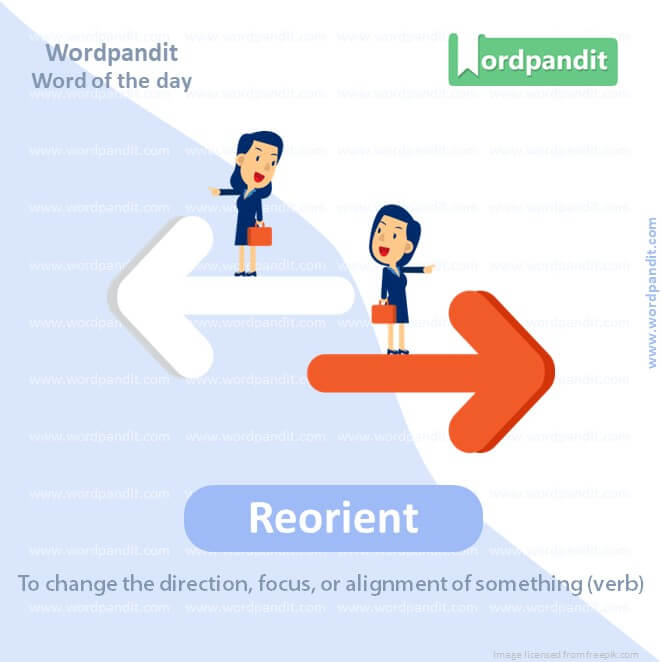
WORD-6: Reorient
CONTEXT: That in turn would bring another round of internal turmoil for the Arab world where countries like Saudi Arabia are trying to reorient their societies and economies in a modern direction.
SOURCE: Times of India
EXPLANATORY PARAGRAPH: Imagine you have a map, and it’s upside down. You’d need to turn it around to read it correctly. “Reorient” is like turning the map to the right direction. It means to change direction or focus.
MEANING: To change the direction, focus, or alignment of something (verb).
PRONUNCIATION: Ree-oh-ree-ent
SYNONYMS: Adjust, realign, shift, redirect, reposition.
USAGE EXAMPLES:
1. She needed to reorient herself after moving to a new city.
2. The company decided to reorient its marketing strategies.
3. The map was upside down, so he reoriented it.
4. They had to reorient the satellite to get a better signal.
WORD-7: Misconstrued
CONTEXT: That hardly improves the meaningful information available to voters. Second, the narrative of states running amok on fiscal matters is misconstrued.
SOURCE: Times of India
EXPLANATORY PARAGRAPH: Imagine someone told you a story, but you got some parts of it wrong when you thought about it later. That means you “misconstrued” the story. It’s when you understand something in a way that isn’t correct.
MEANING: Understood wrongly or inaccurately (verb).
PRONUNCIATION: Miss-con-strood
SYNONYMS: Misunderstood, misinterpreted, misread, mistaken, misjudged.
USAGE EXAMPLES:
1. His silence was misconstrued as indifference.
2. She misconstrued my comments, which led to an argument.
3. The rules are often misconstrued by newcomers.
4. I hope my intentions won’t be misconstrued.
WORD-8: Concealment
CONTEXT: Funding instruments such as electoral bonds allow concealment of the source of funding even though it can influence public policy.
SOURCE: Times of India
EXPLANATORY PARAGRAPH: Think of when you play hide-and-seek and you hide behind the curtains. You’re in “concealment” because you’re hidden from whoever is seeking. It’s the act of hiding something or keeping it secret.
MEANING: The action of hiding something or preventing it from being known (noun).
PRONUNCIATION: Con-seel-ment
SYNONYMS: Hiding, cover, disguise, masking, shrouding.
USAGE EXAMPLES:
1. The concealment of evidence is a serious crime.
2. The dense forest provided perfect concealment for the animals.
3. He wore a mask for concealment.
4. Her concealment of the truth led to misunderstandings.
WORD-9: Unambiguous
CONTEXT: If the main opposition party has flipped and flopped, the ruling BJP has been unambiguous in condemning the terror attack and expressing solidarity with Israel.
SOURCE: Indian Express
EXPLANATORY PARAGRAPH: Imagine you have two roads to go home, and you’re confused about which one to take. But if there’s just one clear, straight road, there’s no confusion. “Unambiguous” is like that one clear road; it means something is very clear and certain with no confusion.
MEANING: Clear and with only one possible meaning or interpretation (adjective).
PRONUNCIATION: Un-am-big-yoo-us
SYNONYMS: Clear-cut, distinct, straightforward, unequivocal, plain.
USAGE EXAMPLES:
1. Her instructions were unambiguous.
2. The law should be unambiguous and easy to understand.
3. The evidence provides an unambiguous answer to the question.
4. He gave an unambiguous commitment to the project.
WORD-10: Reluctance
CONTEXT: Atal Bihari Vajpayee built on the foundation and ended Delhi’s reluctance to host the Israeli Prime Minister.
SOURCE: Indian Express
EXPLANATORY PARAGRAPH: Have you ever felt like you really, really didn’t want to do something, like cleaning up your toys? That feeling of not wanting to do it is called “reluctance.” It’s when you’re unsure or hesitant about doing something.
MEANING: Unwillingness or hesitation to do something (noun).
PRONUNCIATION: Re-luck-tance
SYNONYMS: Unwillingness, hesitancy, disinclination, aversion, resistance.
USAGE EXAMPLES:
1. There was a clear reluctance among the members to agree.
2. Her reluctance to answer made him more curious.
3. Despite his initial reluctance, he turned out to be a great leader.
4. The team showed no reluctance in taking on the challenge.
Vocabulary In English
Dancing within the vibrant scheme of language learning, a profound understanding of ‘vocabulary in English’ is indispensable. These sets of words, serving as the pillars of communication, lay the foundation for effective and fluent exchange of ideas. Yet the question begs, how should one go about mastering ‘vocabulary in English’?
Embracing ‘vocabulary in English’ demands a well-rounded understanding, far more than mere surface memorization. It is of immense benefit to explore a variety of reading materials, such as books, newspapers, magazines, and online content. This broad exposure yields a practical understanding of how and when words are used, thereby enriching your command over ‘vocabulary in English’.
To aid the learning of ‘vocabulary in English’, memory-enhancement techniques come to the rescue. Regularly using flashcards, or applications that reinforce the principles of spaced repetition, can drastically improve memory retention. Aiding this, the use of mnemonic devices to associate words with unique stories or images in your mind has shown to greatly assist recall.
Practical application further paves the way for mastering ‘vocabulary in English’. By using the learnt words actively in your daily conversations, you cement their grasp in memory and understand their practical usage.
Rounding off, regular reviews of ‘vocabulary in English’ is the secret ingredient in the recipe for success. Consistent revision sessions solidify the retention of previously learned words and maintain a fresh connection with them.
To conclude, the path to mastering ‘vocabulary in English’ is an insightful journey, made enjoyable with diverse resources, effective memory techniques, practical usage, and regular review sessions. As you immerse into this linguistic voyage, every word you learn brews a unique tale, enhancing the narrative of your language proficiency and guiding you towards becoming a skilled communicator.









